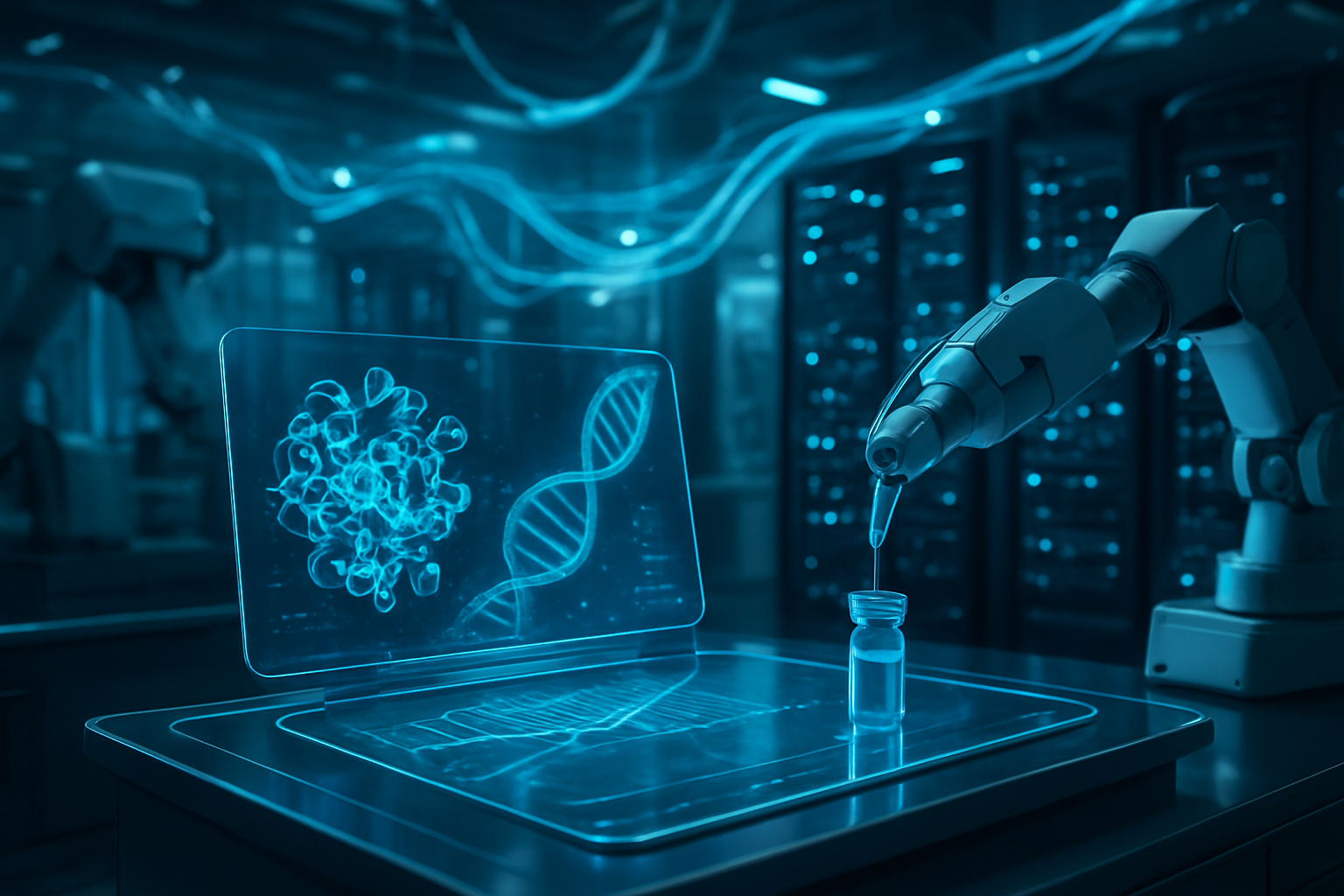In the annals of scientific history, few moments represent a clearer "before and after" than the arrival of AlphaFold 3. Developed by Google DeepMind and its dedicated drug-discovery arm, Isomorphic Labs, this model has fundamentally shifted the paradigm of biological research. While its predecessor famously solved the 50-year-old protein-folding problem, AlphaFold 3 has gone significantly further, providing a unified, high-resolution map of the entire "interactome." By predicting how proteins, DNA, RNA, and various ligands interact in a dynamic cellular dance, the model has effectively turned biology from a discipline of trial and error into a predictable, digital science.
The immediate significance of this development was immortalized in late 2024 when the Nobel Prize in Chemistry was awarded to Demis Hassabis and John Jumper of Google DeepMind (NASDAQ: GOOGL). By January 2026, the ripple effects of that recognition are visible across every major laboratory on the planet. The AlphaFold Server, a free platform for non-commercial research, has become the "microscope of the 21st century," allowing scientists to visualize molecular structures that were previously invisible to traditional imaging techniques like X-ray crystallography or cryo-electron microscopy. This democratization of high-end structural biology has slashed the initial phases of drug discovery from years to mere months, igniting a gold rush in the development of next-generation therapeutics.
Technically, AlphaFold 3 represents a radical departure from the architecture of AlphaFold 2. While the earlier version relied on a complex system of Multiple Sequence Alignments (MSA) to predict static protein shapes, AlphaFold 3 utilizes a generative Diffusion Transformer—a cousin to the technology that powers state-of-the-art image generators like DALL-E. This "diffusion" process begins with a cloud of atoms and iteratively refines their positions until they settle into their most thermodynamically stable 3D configuration. This allows the model to handle a far more diverse array of inputs, predicting the behavior of not just proteins, but the genetic instructions (DNA/RNA) that build them and the small-molecule "ligands" that act as drugs.
The leap in accuracy is staggering. Internal benchmarks and independent validations throughout 2025 confirmed that AlphaFold 3 offers a 50% to 100% improvement over previous specialized tools in predicting how drugs bind to target sites. Unlike earlier models that struggled to account for the flexibility of proteins when they meet a ligand, AlphaFold 3 treats the entire molecular complex as a single, holistic system. This "physics-aware" approach allows it to model chemical modifications and the presence of ions, which are often the "keys" that unlock or block biological processes.
Initial reactions from the research community were a mix of awe and urgency. Dr. Frances Arnold, a fellow Nobel laureate, recently described the model as a "universal translator for the language of life." However, the sheer power of the tool also sparked a race for computational supremacy. As researchers realized that structural biology was becoming a "big data" problem, the demand for specialized AI hardware from companies like NVIDIA (NASDAQ: NVDA) skyrocketed, as labs sought to run millions of simulated experiments in parallel to find the few "goldilocks" molecules capable of curing disease.
The commercial implications of AlphaFold 3 have completely reorganized the pharmaceutical landscape. Alphabet Inc.’s Isomorphic Labs has moved from a research curiosity to a dominant force in the industry, securing multi-billion dollar partnerships with titans like Eli Lilly and Company (NYSE: LLY) and Novartis (NYSE: NVS). By January 2026, these collaborations have already yielded several "Phase I-ready" oncology candidates that were designed entirely within the AlphaFold environment. These drugs target "undruggable" proteins—receptors with shapes so elusive that traditional methods had failed to map them for decades.
This dominance has forced a competitive pivot from other tech giants. Meta Platforms, Inc. (NASDAQ: META) has doubled down on its ESMFold models, which prioritize speed over the granular precision of AlphaFold, allowing for the "meta-genomic" folding of entire ecosystems of bacteria in a single day. Meanwhile, the "OpenFold3" consortium—a group of academic labs and rival biotech firms—has emerged to create open-source alternatives to AlphaFold 3. This movement was spurred by Google's initial decision to limit access to the model's underlying code, creating a strategic tension between proprietary corporate interests and the global "open science" movement.
The market positioning is clear: AlphaFold 3 has become the "operating system" for digital biology. Startups that once spent their seed funding on expensive laboratory equipment are now shifting their capital toward "dry lab" computational experts. In this new economy, the strategic advantage lies not in who can perform the most experiments, but in who has the best data to feed into the models. Companies like Johnson & Johnson (NYSE: JNJ) have responded by aggressively digitizing their decades-old proprietary chemical libraries, hoping to fine-tune AlphaFold-like models for their specific therapeutic areas.
Beyond the boardroom, the wider significance of AlphaFold 3 marks the beginning of the "Post-Structural Era" of biology. For the first time, the "black box" of the human cell is becoming transparent. This transition is often compared to the Human Genome Project of the 1990s, but with a crucial difference: while the Genome Project gave us the "parts list" of life, AlphaFold 3 is providing the "assembly manual." It fits into a broader trend of "AI for Science," where artificial intelligence is no longer just a tool for analyzing data, but a primary engine for generating new knowledge.
However, this breakthrough is not without its controversies. The primary concern is the "biosecurity gap." As these models become more capable of predicting how molecules interact, there is a theoretical risk that they could be used to design novel toxins or enhance the virulence of pathogens. This has led to intense debates within the G7 and other international bodies regarding the regulation of "dual-use" AI models. Furthermore, the reliance on a single corporate entity—Google—for the most advanced biological predictions has raised questions about the sovereignty of scientific research and the potential for a "pay-to-play" model in life-saving medicine.
Despite these concerns, the impact is undeniably positive. In the Global South, the AlphaFold Server has allowed researchers to tackle "neglected diseases" that rarely receive major pharmaceutical funding. By being able to model the proteins of local parasites or viruses for free, small labs in developing nations are making breakthroughs in vaccine design that would have been financially impossible five years ago. This aligns AlphaFold with the greatest milestones in AI history, such as the victory of AlphaGo, but with the added weight of directly improving human longevity and health.
Looking ahead, the next frontier for AlphaFold is the transition from static 3D "snapshots" to full 4D "movies." While AlphaFold 3 can predict the final resting state of a molecular complex, it does not yet fully capture the chaotic, vibrating movement of molecules over time. Experts predict that by 2027, we will see "AlphaFold-Dynamic," a model capable of simulating molecular dynamics at the femtosecond scale. This would allow scientists to watch how a drug enters a cell and binds to its target in real-time, providing even greater precision in predicting side effects and efficacy.
Another major development on the horizon is the integration of AlphaFold 3 with "AI Co-Scientists." These are multi-agent AI systems that can independently read scientific literature, formulate hypotheses, use AlphaFold to design a molecule, and then command automated "cloud labs" to synthesize and test the substance. This end-to-end automation of the scientific method is no longer science fiction; several pilot programs are currently testing these systems for the development of sustainable plastics and more efficient carbon-capture materials.
Challenges remain, particularly in modeling the "intrinsically disordered" regions of proteins—parts of the molecule that have no fixed shape and behave like wet spaghetti. These regions are involved in many neurodegenerative diseases like Alzheimer's. Solving this "structural chaos" will be the next great challenge for the DeepMind team. If successful, the implications for an aging global population could be profound, potentially unlocking treatments for conditions that were once considered an inevitable part of decline.
AlphaFold 3 has effectively ended the era of "guesswork" in molecular biology. By providing a unified platform to understand the interactions of life's fundamental components, it has accelerated the pace of discovery to a rate that was unthinkable at the start of the decade. The Nobel Prize awarded to its creators was not just a recognition of a clever algorithm, but an acknowledgment that AI has become an essential partner in human discovery. The key takeaway for 2026 is that the bottleneck in biology is no longer how to see the molecules, but how fast we can act on the insights provided by these models.
In the history of AI, AlphaFold 3 will likely be remembered as the moment the technology proved its worth beyond the digital realm. While large language models changed how we write and communicate, AlphaFold changed how we survive. It stands as a testament to the power of interdisciplinary research, blending physics, chemistry, biology, and computer science into a single, potent tool for human progress.
In the coming weeks and months, the industry will be watching for the first "AlphaFold-designed" drugs to clear Phase II clinical trials. Success there would prove that the models are not just technically accurate, but clinically transformative. We should also watch for the "open-source response"—the release of models like Boltz-1 and OpenFold3—which will determine whether the future of biological knowledge remains a proprietary secret or a common heritage of humanity.
This content is intended for informational purposes only and represents analysis of current AI developments.
TokenRing AI delivers enterprise-grade solutions for multi-agent AI workflow orchestration, AI-powered development tools, and seamless remote collaboration platforms.
For more information, visit https://www.tokenring.ai/.









